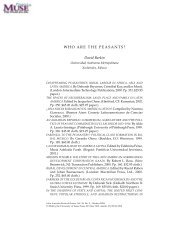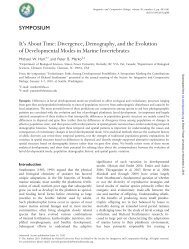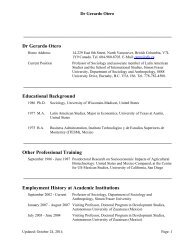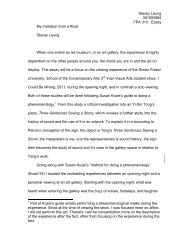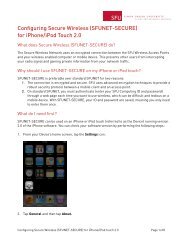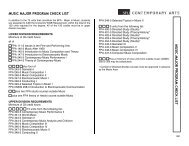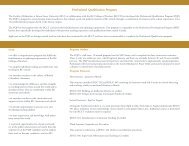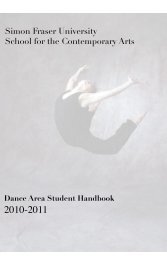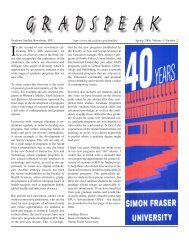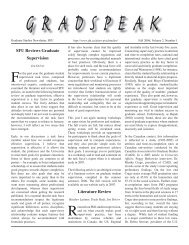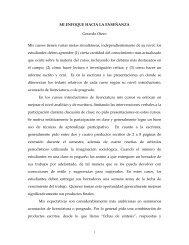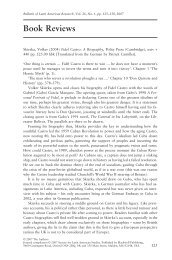Lexicon-Based Methods for Sentiment Analysis - Simon Fraser ...
Lexicon-Based Methods for Sentiment Analysis - Simon Fraser ...
Lexicon-Based Methods for Sentiment Analysis - Simon Fraser ...
You also want an ePaper? Increase the reach of your titles
YUMPU automatically turns print PDFs into web optimized ePapers that Google loves.
Computational Linguistics Volume 37, Number 2<br />
Computational Linguistics, pages 701–709,<br />
Singapore.<br />
Dave, Kushal, Steve Lawrence, and David M.<br />
Pennock. 2003. Mining the peanut gallery:<br />
Opinion extraction and semantic<br />
classification of product reviews. In<br />
Proceedings of the Twelfth International<br />
World Wide Web Conference (WWW 2003),<br />
pages 519–528, Budapest.<br />
Devitt, Ann and Khurshid Ahmad. 2007.<br />
<strong>Sentiment</strong> polarity identification in<br />
financial news: A cohesion-based<br />
approach. In Proceedings of the 45th Annual<br />
Meeting of the Association <strong>for</strong> Computational<br />
Linguistics, pages 984–991, Prague.<br />
Esuli, Andrea and Fabrizio Sebastiani.<br />
2006. SentiWordNet: A publicly available<br />
lexical resource <strong>for</strong> opinion mining. In<br />
Proceedings of 5th International Conference on<br />
Language Resources and Evaluation (LREC),<br />
pages 417–422, Genoa.<br />
Fellbaum, Christiane, editor. 1998. WordNet:<br />
An Electronic Lexical Database. MIT Press,<br />
Cambridge, MA.<br />
Finn, Aidan and Nicholas Kushmerick. 2003.<br />
Learning to classify documents according<br />
to genre. In Proceedings of IJCAI Workshop<br />
on Computational Approaches to Text Style<br />
and Synthesis,Acapulco.<br />
Fletcher, Jeremy and Jon Patrick. 2005.<br />
Evaluating the utility of appraisal<br />
hierarchies as a method <strong>for</strong> sentiment<br />
classification. In Proceedings of the<br />
Australasian Language Technology<br />
Workshop, pages 134–142, Sydney.<br />
Giannakidou, Anastasia. 1998. Polarity<br />
Sensitivity as (Non)Veridical Dependency.<br />
John Benjamins, Amsterdam and<br />
Philadelphia.<br />
Giannakidou, Anastasia. 2001. Varieties of<br />
polarity items and the (non)veridicality<br />
hypothesis. In Ton van der Wouden,<br />
editor, Perspectives on Negation and Polarity<br />
Items. John Benjamins, Amsterdam and<br />
Philadelphia, pages 99–127.<br />
Goldberg, Andrew B. and Xiaojin Zhu. 2006.<br />
Seeing stars when there aren’t many stars:<br />
Graph-based semi-supervised learning <strong>for</strong><br />
sentiment categorization. In Proceedings of<br />
HLT-NAACL 2006 Workshop on Textgraphs:<br />
Graph-based Algorithms <strong>for</strong> Natural Language<br />
Processing, pages 45–52, New York.<br />
Greenberg, Joseph H. 1966. Language<br />
Universals, with Special Reference to Feature<br />
Hierarchies. Mouton, The Hague.<br />
Greene, Stephan and Philip Resnik. 2009.<br />
More than words: Syntactic packaging<br />
and implicit sentiment. In Proceedings of<br />
Human Language Technologies: The 2009<br />
304<br />
Annual Conference of the North American<br />
Chapter of the ACL, pages 503–511,<br />
Boulder, CO.<br />
Halliday, Michael A. K. 1985. An Introduction<br />
to Functional Grammar. Arnold, London,<br />
1st edition.<br />
Hatzivassiloglou, Vasileios and Kathleen<br />
McKeown. 1997. Predicting the semantic<br />
orientation of adjectives. In Proceedings<br />
of 35th Meeting of the Association <strong>for</strong><br />
Computational Linguistics, pages 174–181,<br />
Madrid.<br />
Horn, Laurence R. 1989. A Natural History of<br />
Negation. University of Chicago Press,<br />
Chicago, IL.<br />
Hu, Minqing and Bing Liu. 2004. Mining<br />
and summarizing customer reviews.<br />
In Proceedings of the ACM SIGKDD<br />
International Conference on Knowledge<br />
Discovery and Data Mining (KDD-2004),<br />
pages 168–177, Seattle, WA.<br />
Jing-Schmidt, Zhuo. 2007. Negativity bias in<br />
language: A cognitive-affective model of<br />
emotive intensifiers. Cognitive Linguistics,<br />
18(3):417–443.<br />
Kennedy, Alistair and Diana Inkpen. 2006.<br />
<strong>Sentiment</strong> classification of movie and<br />
product reviews using contextual valence<br />
shifters. Computational Intelligence,<br />
22(2):110–125.<br />
Ketal, R. 1975. Affect, mood, emotion, and<br />
feeling: Semantic considerations. American<br />
Journal of Psychiatry, 132:1215–1217.<br />
Kilgarriff, Adam. 2007. Googleology is<br />
bad science. Computational Linguistics,<br />
33(1):147–151.<br />
Kim, Soo-Min and Eduard Hovy. 2004.<br />
Determining the sentiment of opinions.<br />
In Proceedings of COLING 2004,<br />
pages 1367–1373, Geneva.<br />
Koppel, Moshe and Jonathan Schler. 2005.<br />
Using neutral examples <strong>for</strong> learning<br />
polarity. In Proceedings of IJCAI 2005,<br />
pages 1616–1617, Edinburgh.<br />
Langacker, Ronald W. 1985. Observations<br />
and speculations on subjectivity. In John<br />
Haiman, editor, Iconicity in Syntax. John<br />
Benjamins, Amsterdam and Philadelphia,<br />
pages 109–150.<br />
Li, Shoushan, Chu-Ren Huang, Guodong<br />
Zhou, and Sophia Yat Mei Lee. 2010.<br />
Employing personal/impersonal views<br />
in supervised and semi-supervised<br />
sentiment classification. In Proceedings<br />
of the 48th Annual Meeting of the<br />
Association <strong>for</strong> Computational Linguistics,<br />
pages 414–423, Uppsala.<br />
Liu, Jingjing and Stephanie Seneff. 2009.<br />
Review sentiment scoring via a


